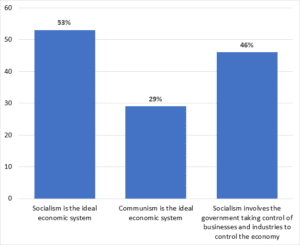What do British Millennials and Zoomers mean by “socialism”?
SUGGESTED



It is a substantial report, more of a book than a paper, which covers a lot of ground. I will not try to summarise it here, because I wouldn’t do it justice. Instead, I’ll just cherry-pick one of its themes, which is on a question that has been irking me for quite some time.
We have known for a number of years that young and middle-aged people in the UK tend to have very positive views of socialism. That is a finding which is consistent across a number of surveys, and which does not depend on how exactly you phrase the question.
But what this does not tell us is what exactly these people mean when they say “socialism”.
Competing uses of “socialism”
In Britain, there are at least three competing uses of the term:
- The classic definition is that “socialism” means collective ownership of the means of production, distribution, and exchange. This is the way Marx and Engels used it; it remains the dictionary definition to this day; and it is the definition used by the figureheads of today’s post-Corbynite “Millennial Socialism” movement.
- Plenty of people confuse “socialism” with social democracy, that is, a capitalist economy with a generous welfare state and extensive provision of public services. This misunderstanding is frustrating for actual socialists, some of whom try their best to make it clear that that is not what they mean. But no matter how many times they explain it, someone will always reply “Yeah but what about Sweden?”
- Finally, some people use “socialism” to describe a set of values, attitudes, and perhaps knee-jerk reflexes, rather than an economic system. This can be positive (being compassionate; sharing is caring) or negative (being envious and lazy; wanting other people’s money without having to work for it).
We know that all three (and possibly more) usages exist, but so far, we haven’t had a numerical breakdown. The Fraser report does not entirely solve this problem, but it narrows things down considerably.
Socialism = communism?
It does this in two ways.
Firstly, they simply replace the amorphous term “socialism” with the blunter term “communism”, and then repeat the same question, to check how this changes the results.
Unsurprisingly, this swap leads to a drop in support across all countries and age groups – but with important differences in degree. In some subgroups, support for “socialism” all but evaporates when you call it “communism” instead. But it does not have that effect among young and middle-aged Britons. The term “communism” is clearly more contentious than the term “socialism”, but one in four British Zoomers, and one in three British Millennials, still say that “the ideal economic system for the United Kingdom is communism”. That is not a majority, but it is still a large number of people.
Socialism = a state-run economy?
Secondly, the pollsters also ask respondents more directly what they mean by “socialism”. They present them with three possible descriptions of it, and ask them whether or not they believe that these descriptions accurately characterise “socialism”. (They are descriptions rather than definitions: it is phrased as “Socialism involves…” rather than “Socialism is…”.)
One of the options is a simplified version of the dictionary definition: socialism “involves the government taking control of companies and industries to control the economy”. Among the British population as a whole, 39% agree that this accurately describes socialism, while 31% disagree. So while there is net approval for the dictionary definition (there are more people who accept it than people who reject it), it is clearly not overwhelming.
However, if we look specifically at the self-identified supporters of socialism (that is, the people who agree that socialism is “the ideal economic system”), the numbers look very different. In this subgroup, 56% agree with the classic definition, while only 20% reject it.
This is, in part, a demographic effect: younger Britons, who are much more likely to be pro-socialist than older ones, are also much more likely to accept the classic Marxist definition than the latter. Among Millennials and Zoomers, 46% accept the Marxist definition of socialism, while only half as many (23%) reject it. Among Baby Boomers, the numbers are 35% vs 38%.
% of British Millennials and Zoomers who agree with the following statements

Reverse McCarthyism
This means that we now have what you could describe as a reverse McCarthyite situation.
A McCarthyite situation would be one where the term “socialism” means something more radical to its opponents than to its supporters, leading to misunderstandings. Supporters think they are saying “We want to be like Sweden”, but their opponents think “Oh no! They want us to be like Cuba!”
In Britain, the opposite is true today. We get the reverse misunderstanding, because the term “socialism” means something more radical to its supporters than it does to its opponents. Opponents of socialism (mostly Boomers and, to a lesser extent, Gen-X-ers) oppose it because they think it means “Entitled young people want free stuff at my expense, without having to work for it.” In other words, they think socialism is bad, but they think it is merely bad within the normal range. However, quite a lot of young and middle-aged socialists in the UK – probably around half of them – actually do mean state ownership of the means of production, rather than just “free stuff”.
If McCarthyism leads to overreactions against a perceived threat of socialism, the present situation leads to an “underreaction”.
Conclusion
The way the term “socialism” is commonly understood varies considerably across the Anglosphere. Canada is furthest away from the classic Marxist definition, the UK is closest, with the US and Australia somewhere in between. Within countries, Millennials and Zoomers are typically closest to it, while Boomers are furthest away, with Generation X somewhere in between. Self-described supporters of socialism are more likely to accept it than opponents or fence-sitters.
The majority of young and middle-aged Britons are not actual “socialists”, even if they say they are, and we are not going to get the full Petrograd-on-Thames experience any time soon. But there are definitely a lot more Millennial/Zoomer socialists than there are Millennial/Zoomer conservatives, let alone Millennial/Zoomer libertarians. So to argue about whether socialists are sufficiently relevant to spend time and effort rebutting their arguments is a bit moot. I don’t know how relevant they are exactly, but I know that they are a lot more relevant than we are.
___
Suggestions for further reading/watching/listening:
- “Perspectives on Capitalism and Socialism: Polling Results from Canada, the United States, Australia, and the United Kingdom” | Jason Clemens and Steven Globerman (Fraser Institute, Canada)
- “How Can We Stop Young People Flocking To Socialism?” | IEA Podcast with Harrison Griffiths and Kristian Niemietz
- “Left turn ahead: Surveying attitudes of young people towards capitalism and socialism” | Kristian Niemietz
- “What “socialism” means – and why it matters” | Kristian Niemietz
- “Socialism: The failed idea that never dies” | Kristian Niemietz
5 thoughts on “What do British Millennials and Zoomers mean by “socialism”?”
Comments are closed.





Why do you frame Mccarthyism as an overreaction?
That was a good read, cheers.
I’d be curious to know if there’s a term to describe people who support price controls (housing, energy, food, transport whatever). And their opposite might be people who think price gouging should be permitted even if it’s not awfully nice behaviour. If there is a term for the price controller fans, it must include an element of mockery e.g. Mayist, Maidenheadist, Bay Areanists. But a suitable term may already exist.
Your use of the word “McCarthyism” is odd – as M. Stanton Evans made clear in his biography of Joseph McCarthy (“Blacklisted By History”) the people Senator McCarthy accused of serving the interests of Stalin and Mao DID serve the interests of Stalin and Mao – normally (although not always) knowingly. The idea that Senator McCarthy persecuted people who just wanted better public services is nonsense – he wanted better public services himself. As for British Communists – yes there are lots of British people who support total Collectivism. I do not know whether telling them about the horrors Collectivism would mean will have much effect – as I have a nasty suspicion that many of them know of these horrors, and wish them to take place in the United Kingdom. Sadly human evil is not rare – not rare at all. Still you may change the opinions of some people – and I hope you do Sir.
Marx came to socialism late. Saint-Simon actually started modern socialism in France a generation before Marx and it had none of the state ownership nonsense that Marx added. Bismarck’s welfare state was the first socialist state. Nazism was a natural extension of it. Welfare states like Sweden and the US are merely older forms of socialism.
PS, Hayek wrote that young people are naturally socialists because they project the family economy on the nation. Capitalism would destroy families and socialism scaled to the national level destroys nations if followed faithfully.
Also, Helmut Schoeck proved in his classic Envy: A Theory of Social Behavior that envy powers socialism.